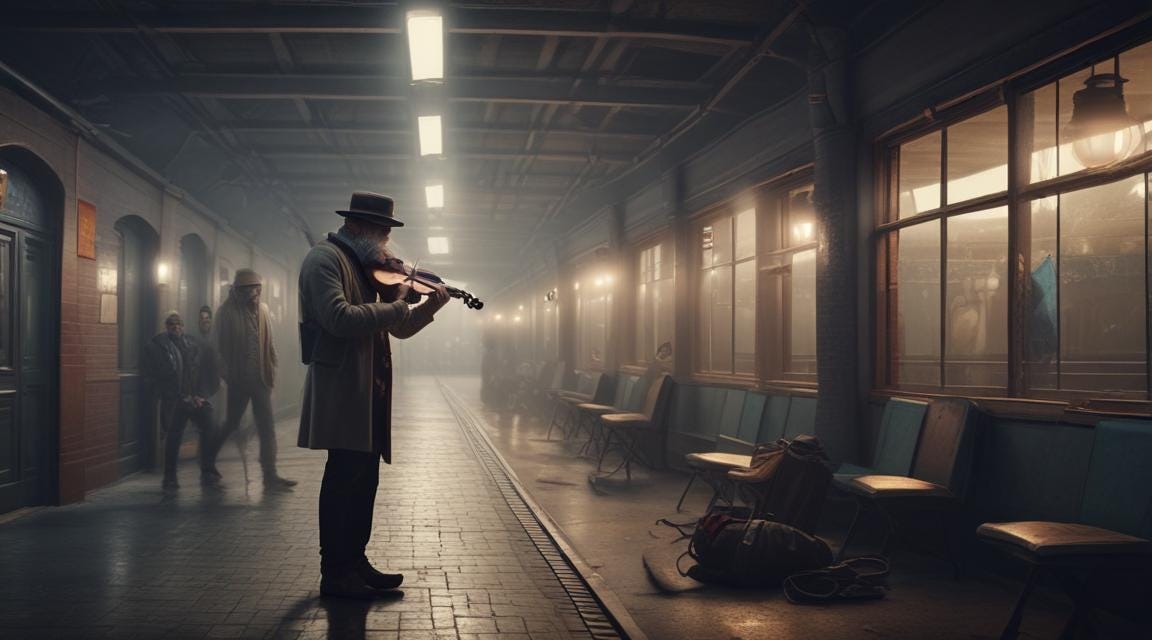Getting out at the underground station at home after 10pm. As I go up the stairs leading to the exit, the piercing sound of a violin singing Vivaldi’s ‘Winter’ wafts from above. It is a curious moment, not only because it has been so long since I’ve heard music in the underground, but because I cannot yet see the musician. In the few seconds of ascending the stairs, a curiosity forms - who is playing this virtuosic piece, and how will my imagination of the player match up to reality?
My hand already reaches for my wallet to contribute some coins - it is so unexpected to be gifted with beauty, this late in the evening, at a not particularly busy underground station.
As the violin races up and down the arpeggios, I reach the top of the stairs, to see one other passer-by standing directly in front of the musician. I go to stand beside him and take in the scene.
The violin player looks about 50, wearing an oversized tan-green long-sleeve with a single cigarette-burnt hole on his chest. A fisherman’s hat in the same colour sits on his head so low it shades the entire top of his face, and prevents anyone from making eye contact. His shoes are in tatters, the fronts on both sides completely unravelled and disconnected from the soles, gaping to reveal his toes.
A few stray threads have come loose from the bow and twitch around wildly as he pulls it deftly back and forth across the strings.
I have coins to give, but he has not left out a container.
He finishes the first movement of Winter, and without pause, moves to the second movement, a slower and more contemplative tone.
The first passer-by departs. I stay, wanting to hear more. He takes his time progressing through the movement, and when it ends, proceeds right away to the next piece: Ave Maria.
In the middle of this piece, the next train arrives, depositing new passengers who clamour up the stairs. They pass between me and the musician, and none pay anything more than a cursory moment of attention to the music being offered.
The small pocket of passengers clears, and I am again the sole audience for this performance. As Ave Maria draws to an end, I am prepared to clap and ask if I can leave him some money. But again, without pause, he rolls immediately to the next piece. It is back to the first movement of Vivaldi’s Winter.
It is such an impressive piece that I linger to hear it again. The notes go off-pitch from time to time, but his discipline shows.
My mind begins sketching a narrative to explain the larger context that brought this man to be playing here this evening:
A classically trained musician who has encountered rough times. The state of his shoes - literally falling apart - tells of how long he has been down on his luck. The choice of his pieces - easily recognizable classics, perhaps his favourite ones when he was training. But the absence of any receptacle for collecting contributions is curious. It is unlikely that he just forgot - this seems an intentional omission. Could he simply be playing tonight just for the sake of it?
But why play for free, when he could easily make money from it? Is it truly just a gift for those who pass?
Could it be that sometimes it is enough to create something simply because we believe it needs to exist now, regardless of whether value comes back to us in the form of money?
And might it be that sometimes we need to create simply because we need to express who and what we are, without thinking how it should return to us?
The piece concludes, and now the next - again the second movement of Winter, confirms that these three pieces are being played on a loop.
There is no moment where I can express my appreciation to him in a way that is more than just with my continued presence. I thank him from a few steps away as he continues the piece, but there is no response or acknowledgement.
I walk away to the sound of Vivaldi, and exit the station into the night.




